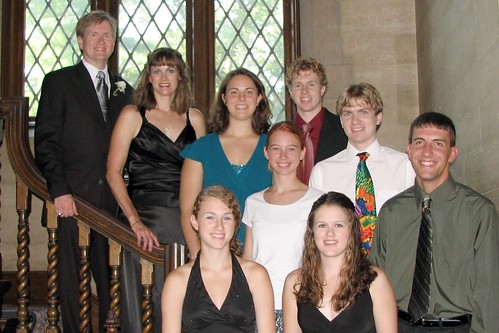=======================================
Thanksgiving is a special holiday. Though we are taught to be thankful all year round, having a day set aside for feeling thankful helps focus our gratitude.
Of course, it has become "Turkey Day" to some, and "Football Day" to some, but in general, with families and friends gathering together, many people do still focus on the thankfulness.
Interestingly, though, at Thanksgiving, people primarily talk about the things they are thankful FOR. This, of course, is perfectly natural. To feel thankful, people need to feel they have received something for which they can give thanks.
For me, there are too many blessings to count and list, but I would certainly start here:
I am so thankful for my family. Words cannot express it. Though I try. I am also thankful for the friends I have, especially for those who think about me frequently, providing me company when I laugh, care when I need it, and conversation - in person or over the network. I am thankful for my work, for my home, and for the beautiful world in which we live.
But I am not done with this Thanksgiving message. I want to continue on to discuss the full meaning of giving thanks.
Here is the first definition of "Thank" from from Dictionary.com:
thank
And for good measure, the definition of "Thanks" from the same source:
thanks (θæŋks) ![[Click for IPA pronunciation guide]](http://sp.dictionary.com/dictstatic/g/d/dictionary_questionbutton_default.gif) | |
| —pl n | |
| 1. | an expression of appreciation or gratitude or an acknowledgment of services or favours given |
In both of these definitions, there is a clear message which is glossed over by many, but it is worth considering. The definitions make it clear there is someone who is thankful, and someone who is receiving the thanks, because the latter did something for the former.
Thanksgiving, as a recent sermon said, is "relational" - that is, it involves a relationship between the one who is thankful and the one who is being thanked.
So, if you are thankful, who are you thankful TO?
Yes, I am thankful to the people in my life who make my life so blessed. And if that's as far as you go in your faith, then be sure to thank the people in your life on Thanksgiving. For, just as a secular Christmas is to be more about giving than receiving, a secular Thanksgiving should be about being thankful, and to be thankful, there must be someone who deserves our thanks. With that in mind, look around at all those people who have made your life better, and express your appreciation and gratitude as you celebrate your Thanksgiving.
To carry the message a bit further, people of faith should pause to recognize that what we have been given, the materials and relationships for which we are thankful, are not merely gifts from people, but gifts from God. The original Pilgrims were not thanking one another. They were thanking God.
If you explain to a child the concept of Thanksgiving -- that we are grateful for the many things around us -- and ask them to list those things, they will often lists parts of nature. The sun, the stars, the lakes.
If a person has no faith in a creator, then there really is no one to thank for these things. Such a person can feel lucky or fortunate to have them, and they should, but they cannot truly be thankful, because they have no one to thank.
But for people who believe in a God, today is the day to thank God, as the true source for all of these blessings. Even the blessings which appear to have come from people are truly an expression of God's love towards us. And for this, thanks are appropriate, and a form of blessing in themselves.
Lord God, Creator of all, Source of Love and Blessings, on this day of Thanksgiving, we thank you, above all, for the gift of life and for the gifts we receive in life. We especially thank you for the people in our lives who show us love and kindness. For these, and for all, we are truly Thankful. Amen.
A happy and blessed Thanksgiving to you all.










